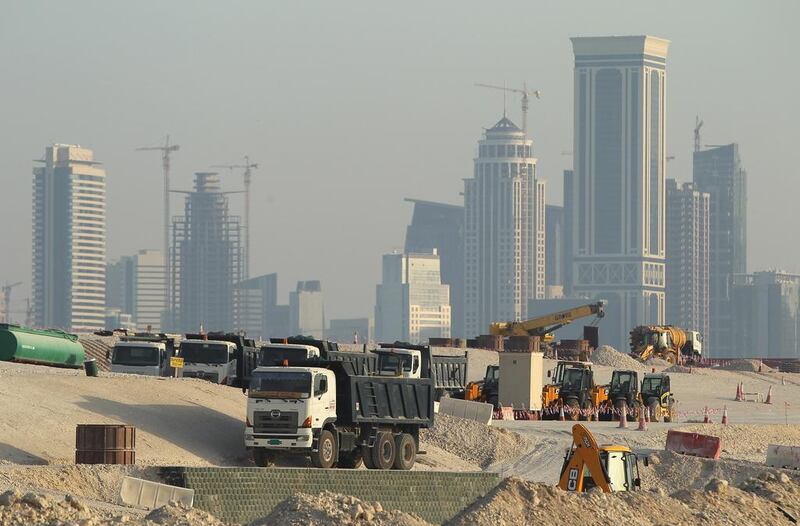ABU SAMRA, QATAR-SAUDI ARABIA BORDER // At Qatar’s only land border crossing, a steady stream of lorries full of construction materials and food rumble past after arriving from Saudi Arabia.
The drivers stop to refuel and refresh themselves after waiting several hours on the Saudi side and then continue toward Doha, 90km away, where their goods will help feed both the emirate’s population and its vast construction programme.
“So many materials come to Qatar through here,” said Tamim Ansar, 40-year-old driver from Sri Lanka who was on his way to Doha from Dammam with a load of electricity cable. “If they close the border, there will be big problems for my company.”
It is here at this vital supply line where Qatar is perhaps most vulnerable to possible pressure from its Arabian Gulf neighbours after a diplomatic fallout between Doha and three other GCC countries.
Saudi Arabia, the UAE and Bahrain withdrew their ambassadors from Doha last month accusing Qatar of failing to implement an agreement not to interfere in their internal affairs. The three Gulf states had become increasingly angered over Qatar’s support of the Muslim Brotherhood.
Saudi then threatened Qatar with a blockade if Doha continued to back the group, according to a Huffington Post report. Riyadh went on to designate the Brotherhood as a terrorist organisation.
The fallout was unprecedented in the GCC’s history and while many analysts say it is unlikely that Saudi Arabia would close its border, Qatar’s small size and geography leave it vulnerable to any such action.
Other than the liquefied natural gas and petroleum upon which it has built its vast wealth, Qatar produces very little and a substantial portion of imports of consumer and industrial goods arrive in the form of re-exports from UAE ports or on lorries through Abu Samra.
About 800 lorries pass through the crossing each day, according to Qatar’s customs department. Although lacking precise import figures, the department says the goods coming in include food and construction materials that arrive from the UAE, Saudi Arabia, Jordan, Lebanon and Egypt.
The materials include everything from concrete to rebar and other materials needed for building in the country. In particular, 38 per cent of Qatar’s food was transported across its Saudi land border in 2013, according to figures quoted in the Qatar-based bq Magazine.
That dependence on Saudi Arabia became apparent over a year ago when Qatar ran out of chicken for several months because Saudi Arabia banned exports to stabilise prices at home. That caused prices to increase dramatically, by as much as 40 per cent, according to Qatari news reports at the time. Disruptions in these areas could also effect progress on building the ambitious residential and commercial developments that Doha has launched as it prepares to host the 2022 Fifa World Cup, said Paul Sullivan, a Middle East security and energy expert at Georgetown University.
“One also has to think how sanctions may affect air, land and other travel for the World Cup,” he said.
Fears that Qatar may face some kind of economic punishment for its support of the Muslim Brotherhood came from a GCC meeting last month in which Saudi Arabia threatened a blockade of Qatar, according to the Huffington Post report.
Mustafa Alani, director of Security at the Geneva-based Gulf Research Center, doubted that fellow GCC members would ever go beyond recalling ambassadors in expressing their anger with each other. The union provides mutual security and economic integration, which member states are unlikely to jeopardise through harsh sanctions such as blockades.
“It’s not a conflict. It’s a dispute. In the history of the GCC, they always keep things at the level of a dispute,” he said. He referred to similar incidents in the past, such as Saudi Arabia’s recalling of its ambassador to Qatar in the 1990s to protest against Al Jazeera’s reporting.
Qatar would also be able to use its vast wealth to circumvent any such blockade.
Doha has managed to secure itself a tremendous amount of independence over the last decade by exporting natural gas around the world, including other GCC members, and hosting a large American military base.
“The fact is that the Saudis and the Emiratis have little leverage left with the Qataris,” said Jim Krane, a Gulf specialist at Rice University’s Baker Institute for Public Policy in Houston, Texas.
foreign.desk@thenational.ae





